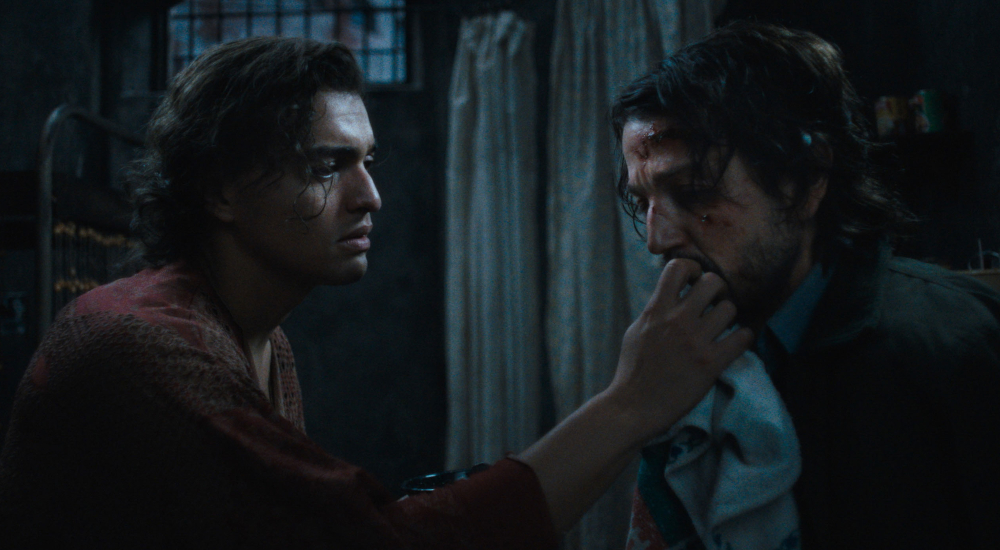"That's not weakness, that's love."
Even with the recent success of John Chu's Wicked: Part I, Broadway adaptions are never easy and are always far from assured success. For every Chicago and Rent, you get a Producers or Dear Even Hansen. Even the most beloved stage productions struggle when they transition mediums. Bill Condon's Kiss of the Spider Woman, based on the Tony Award-winning 1993 Broadway musical by John Kander and Fred Ebb, is far from a surefire hit. And when the final notes ring loud and clear, the film succeeds by its respective pieces, not its overall collective.
Set in 1983, during Argentina's Dirty War, the film begins as Molina (Tonatiuh), a window dresser convicted of public indecency, is forced to share a cell with Valentin (Diego Luna), a high-ranking political prisoner. While their relationship is initially a struggle, they ultimately form a strong bond as Molina shares his love for musicals, recounting the plot of one of Hollywood's most intoxicating offerings starring his favorite big screen diva, Ingrid Luna (Jennifer Lopez).
Flipping between vastly opposing worlds, Condon works to showcase two alternative styles as we watch the harsh reality of the caged, cramped Argentinian prison cell transcend into the bold, technicolor scenes of the fictional 1050s movie musical. That film stars the alluring Luna as Aurora. The getaway to the world of beauty and excitement works as an escape for Molina, who recounts the scenes with optimistic excitement to shirk the filth and grime surrounding him.
Much like the original stage production that garnered Chita Rivera her second Tony, Jennifer Lopez shines from start to finish. After a painful twelve months, the multi-hyphenated global superstar needed a big win, and she more than delivered. Playing to her strengths, she embodies the fictional icon, giving the vibrant settings a stroke of added magnetism, stealing every scene she is in and giving the film some much-needed vibrancy and vitality.
Not to be outdone, Diego Luna and Tonatiuh more than hold their own. Though their opportunities are understandably more limited, both offer their souls to their respective parts. Sadly, their work is often distracted by the set pieces around them, most of which feel staged and unduly simplified.
While Molina's retelling is visually stylized to look imaginative, it works beautifully within the context of the created film world. The same cannot be said of the men's reality behind bars. Sure, there were some apparent budget cuts. Preserving the stage presentation has worked for films of the past. But the effect is too blatant here, giving off an overall result that looks equally cheap and unrealistic.
But, as mentioned, most of that disappears when Lopez takes center stage. Here, Condon relishes in the style of the time, sticking to long takes that often eliminate the sought-after close-up. The decision allows the film to showcase Lopez's gift as she endures lengthy numbers. While the style has its purpose, it also removes the personal connection between the character and the audience. It doesn't ruin the segments, but it will likely frustrate Lopez's loyal fanbase.
But all this lies within the parameters of Molina's imagination. Back in the jail cell, where our two male leads face a much darker reality, the tension between them has begun to subside. Though Molina's dangerous secret remains unrecognized, Valentin has noticeably softened, seeing his cellmate as a caring, albeit somewhat damaged individual. Their connection appears genuine, their chemistry growing with each passing scene. And even if their intimacy appears quick, the heart and spirit of their bond feels right.
These intimate moments prove vital to the story's success, both within the actuality of the Dirty War conflict and Molina's imaginative attempt at mental escapism. And though the performances are much better than the composite, and ignoring that the film, set in Argentina, doesn't feature any actor from the host country, Kiss of the Spider Womanestablishes itself as decent enough. That said, it is also nothing more than built-in fanfare.

